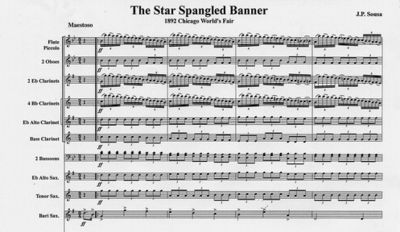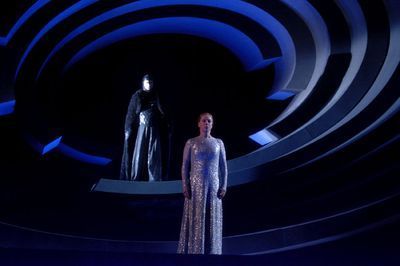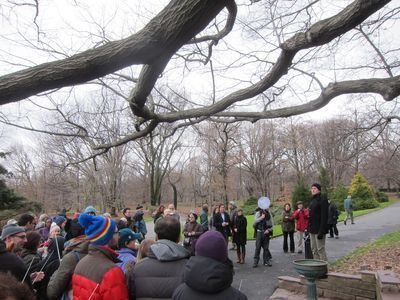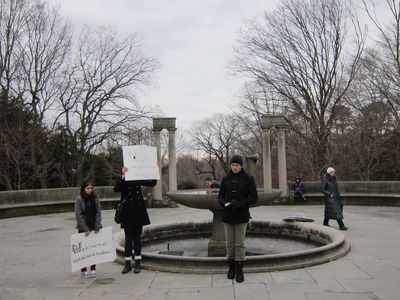Alex Ross's Blog, page 178
December 31, 2012
David Lang, Michael Gordon
In this week's issue of The New Yorker, I have a review of David Lang's love fail and Michael Gordon's Timber, both at BAM. The video above, filmed at a hardware store in Alexandria VA, comes from the folks at NPR. Helpful souls at Cantaloupe Music allowed me to preview upcoming recordings of Julia Wolfe's Steel Hammer, Gordon's Rushes (for bassoon septet), and the collective Bang on a Can work Shelter. I also worked in a mention of New Amsterdam Records, which, as most readers will know, was hit hard by Hurricane Sandy; see Steve Smith's important account of a recent benefit concert in Chicago.
Star-Spangled Wagner
Image from the Library of Congress; audio of Sousa's International Congress Fantasy from the United States Marine Band's recording The Heritage of John Philip Sousa, Vol. 2.
Yes, it's John Philip Sousa's arrangement of "The Star-Spangled Banner" in the manner of the Tannhäuser Overture, written for the Chicago World's Fair. Sousa was adapting older material here; his International Congress Fantasy, an elaborate fantasia on national airs composed for Jacques Offenbach's concerts at the 1876 Centennial Exhibition in Philadelphia, ends with much the same music. Sousa was young and little known at that time, and his slyly Wagnerian take on the future national anthem was eclipsed by the famously mediocre and expensive Centennial March that Wagner himself penned for the occasion. There are many more Wagnerian oddities from the early days of recording in the Library of Congress Jukebox, as I've pointed out before; perhaps the oddest is Sousa's attempt at perking up the apocalyptic transformation music from Act III of Parsifal. "My two most popular pieces are the ‘Tannhäuser
Overture’ and the ‘Stars and Stripes,'" Sousa said in 1899. "Wagner was a brass band man, anyway.”
December 30, 2012
Glyndebourne Tristan
A gift from the Guardian: streaming video of Nikolaus Lehnhoff's 2007 production of Tristan at Glyndebourne, with Nina Stemme, Robert Gambill, Katarina Karnéus, René Pape, and Bo Skovhus. Jiří Bĕlohlávek conducts.
The Lives They Lived
WQXR has a slide show of the great retinue of classical musicians who died in 2012. I would add, among others, Jonathan Harvey and Lisa Della Casa. Richard Rodney Bennett died in this city on Christmas Eve; browsing through his many and varied achievements on YouTube, I happened upon a scene from Murder on the Orient Express, which swept me away when I was a kid and still gives delight.
December 29, 2012
The Non-Classical Music They Made
For the past five years, the New York Times Magazine has offered an end-of-year feature called The Music They Made — an audio collage of musicians who died that year. Lisa Hirsch was, I think, the first to notice that the magazine has a thing against classical music; with the exception of David Mason, the trumpeter who played on "Penny Lane," no Western classical musician has appeared in these compilations. The omission is particularly maddening this year, since we lost two gigantic figures: Dietrich Fischer-Dieskau and Elliott Carter. Almost every other genre has been represented at one time or another, including avant-garde jazz (in the person of Rashied Ali). If the feature were labeled "non-classical music," that would at least be honest. But the editors seem reluctant to admit their bias, which extends also to print: you won't find Fischer-Dieskau or Carter in the 2012 "The Lives They Lived" issue. This annual insult to people who love classical music deserves a protest. Here is contact information for the Times; those who are active on Twitter can mention @NYTmag.
Update: Hugo Lindgren, the editor of the Times Magazine, cordially replied to me on Twitter, explaining that classical music "lends itself less well to the montage approach" but adding that the feature "wouldn't suffer for being broader."
December 21, 2012
Raging contradictions
Pope Benedict's latest attack on gay marriage unwittingly contains an eloquent argument for it:
...The question of the family is not just about a particular social construct, but about man himself—about what he is and what it takes to be authentically human. The challenges involved are manifold. First of all there is the question of the human capacity to make a commitment or to avoid commitment. Can one bind oneself for a lifetime? Does this correspond to man’s nature? Does it not contradict his freedom and the scope of his self-realization? Does man become himself by living for himself alone and only entering into relationships with others when he can break them off again at any time? Is lifelong commitment antithetical to freedom? Is commitment also worth suffering for? Man’s refusal to make any commitment—which is becoming increasingly widespread as a result of a false understanding of freedom and self-realization as well as the desire to escape suffering—means that man remains closed in on himself and keeps his “I” ultimately for himself, without really rising above it. Yet only in self-giving does man find himself, and only by opening himself to the other, to others, to children, to the family, only by letting himself be changed through suffering, does he discover the breadth of his humanity.
Why, then, the condemnation of lifelong commitments between men and between women? What would the Pope say to John Ziegler, the hundred-year-old South Carolina poet who published a book about his partner of forty-nine years? (Ziegler sent me a copy, which I will always treasure.) The intellectual and moral incoherence of this position cannot be sustained.
Previously: Love on the March.
Winterize
Here are a few pictures from Christopher Dylan Herbert's performance of Winterreise in various locations in the Brooklyn Botanic Garden earlier today— a remarkably refined account, given the unusual circumstances. I also made a video of "Rast," but wind noise renders much of it hard to hear. The audience itself provided the accompaniment, by way of hand-held radios broadcasting Timothy Long's rendition of the piano part. (Long, a conductor and pianist, is the singer's husband.) Students from the Parsons School of Design prepared and displayed the translations; Jonathan Zalben handled the sound design; JJ Hudson directed the show. Herbert and company go out to Staten Island this evening to repeat the feat, as Make Music Winter unfolds throughout the city. Note also Amy Garapic and Matt Evans's Village in Volume project; they were the core of the heroic Vexations last summer.
"Der Leiermann."
December 20, 2012
Apex 2012
When the world ends, the reign of Bea begins.
Over at the mothership, I've published a list of Ten Memorable Performances of 2012. In all, it was a splendid year for the new, the recent, and the modern; Herreweghe's St. Matthew Passion and Joyce DiDonato's Drama Queens program were my only pre-1900 picks. See also an end-of-year discussion with Steve Smith, Heidi Waleson, and Anne Midgette, the drift of which matches my own feelings. I'm very disappointed that I missed David T. Little's Dog Days, which both Heidi and Steve singled out for praise. Steve, il miglior fabbro, will have the final word, when his CD list is published in Time Out NY; advance rumors suggest that it will be a happy day for Stéphane Denève.
Do you hear what I hear...
Joan Brossa on Wagner
“There's a certain type of Mediterranean who feels strongly
attracted to Wagner; it’s a curious phenomenon, due, I think, to the fact that
people always want what they haven’t got. Wagner himself went to Venice to die.”
— from a 1991 interview
Alex Ross's Blog
- Alex Ross's profile
- 425 followers









